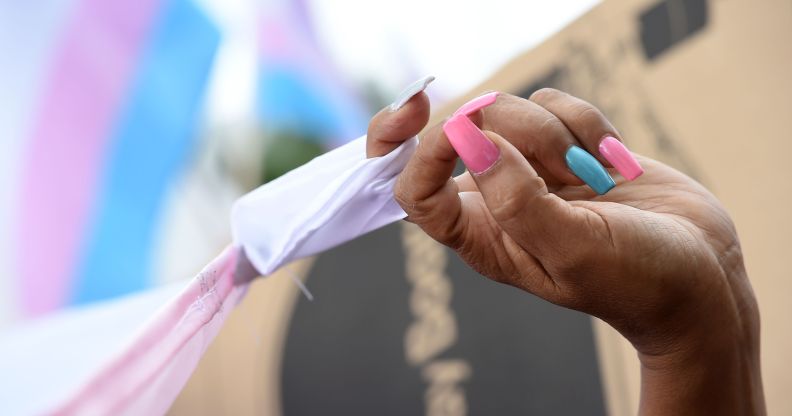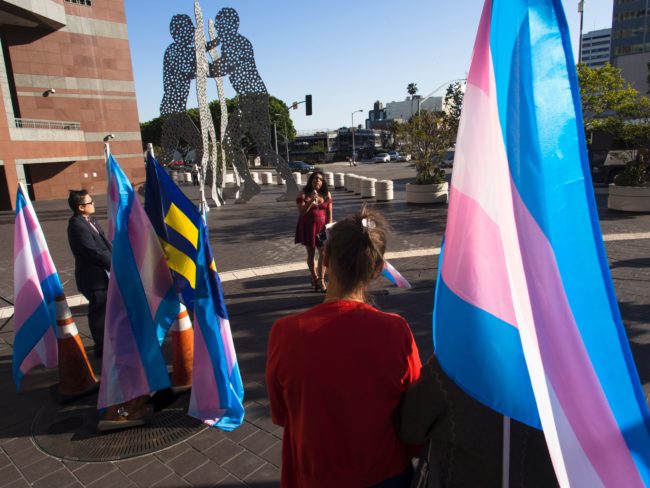California adopts self-ID gender recognition law

A marcher has their fingernails painted in the pink and blue transgender community colors at the Los Angeles Pride March, June 11, 2017 in Hollywood, California.
A self-ID law that allows transgender people to change their legal gender has come into effect in California.
Parts of California’s Gender Recognition Act, which was passed in October 2017, came into effect on January 1.
The law allows transgender and non-binary people in the state to submit paperwork to update the gender listed on state ID cards and driver’s licences without having to go through a medicalised application process.
Trans people can self-identify in the gender categories “of male, female, or nonbinary,” with California becoming one of the few states to permit recognition of non-binary people.
The “self-certification” aspect of the law was not contentious at the time the bill was passed, despite similar proposals attracting significant backlash in the UK.
According to The Guardian, an estimated 54,600 people are expected to take advantage of the reforms in the first year, “self-certifying” their gender.
California permits self-ID gender recognition
Trans Californians welcomed the change.
Genderqueer Google employee Alon Altman live-tweeted their experience of “self-certifying” their gender as non-binary via the Department of Motor Vehicles (DMV).
Good morning! I have all my documents at hand and on my way to the @CA_DMV. My appointment is for 9:40 so I’ll be there just in time. #EnbyDMV
— epsalon ⚧ (@epsalon) January 2, 2019
Altman said: “I’m glad that finally non-binary people are recognized, that we exist.”
Nazanin Szanto of Oakland told the Guardian: “It’s the very beginning of a way larger fight. Non-binary people have been here forever … Now, we’re getting recognition. We’re getting a chance to live slightly more authentically.”
A previously-enacted portion of California’s Gender Recognition Act also allows trans people to update their birth certificate.
Although no medical evidence is required, applicants “have to submit an affidavit attesting, under penalty of perjury, that the request for a change of gender is to conform their legal gender to their gender identity
and not for any fraudulent purpose.”

Members of the transgender community gather to celebrate International Transgender Day of Visibility, March 31, 2017 in Los Angeles, California. (ROBYN BECK/AFP/Getty)
Because federal law only permits the genders ‘male’ and ‘female,’ people recognised as non-binary in California will not have their chosen identity recognised on documents issued by the US federal government, including Social Security cards, passports and green cards.
Self-ID laws are ‘international best practice’ for gender recognition
Self-identification has become the international standard for modern gender recognition laws, with a number of European countries adopting self-ID legislation.
Malta, Norway, Denmark, Portugal, Ireland and Belgium have all adopted the self-ID system of gender recognition.
Similar proposals are under consideration in the UK, but a groundswell of opposition to the plans could stop self-ID coming into effect.
Media columnists have claimed the proposals will make women’s facilities, including shelters and changing rooms, unsafe by permitting transgender women.
However, evidence from other countries that have adopted self-ID laws shows that the impact has been non-existent other than granting rights to trans people.
The Republic of Ireland quietly adopted a liberal gender recognition law back in 2015, allowing transgender people to change their gender on a self-declaratory basis by filling out a simple form.
The Irish government has not flagged any issues with the self-declaration law in the years it has been in operation.

